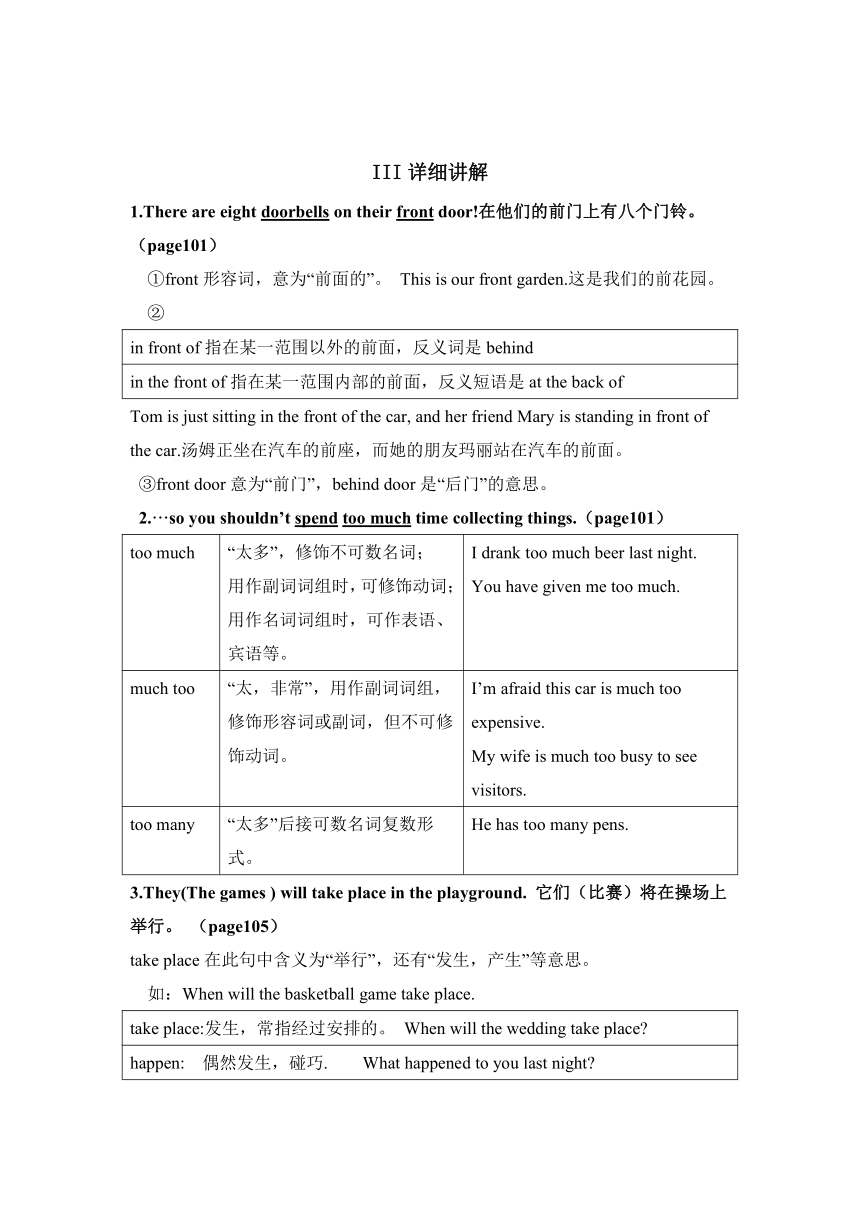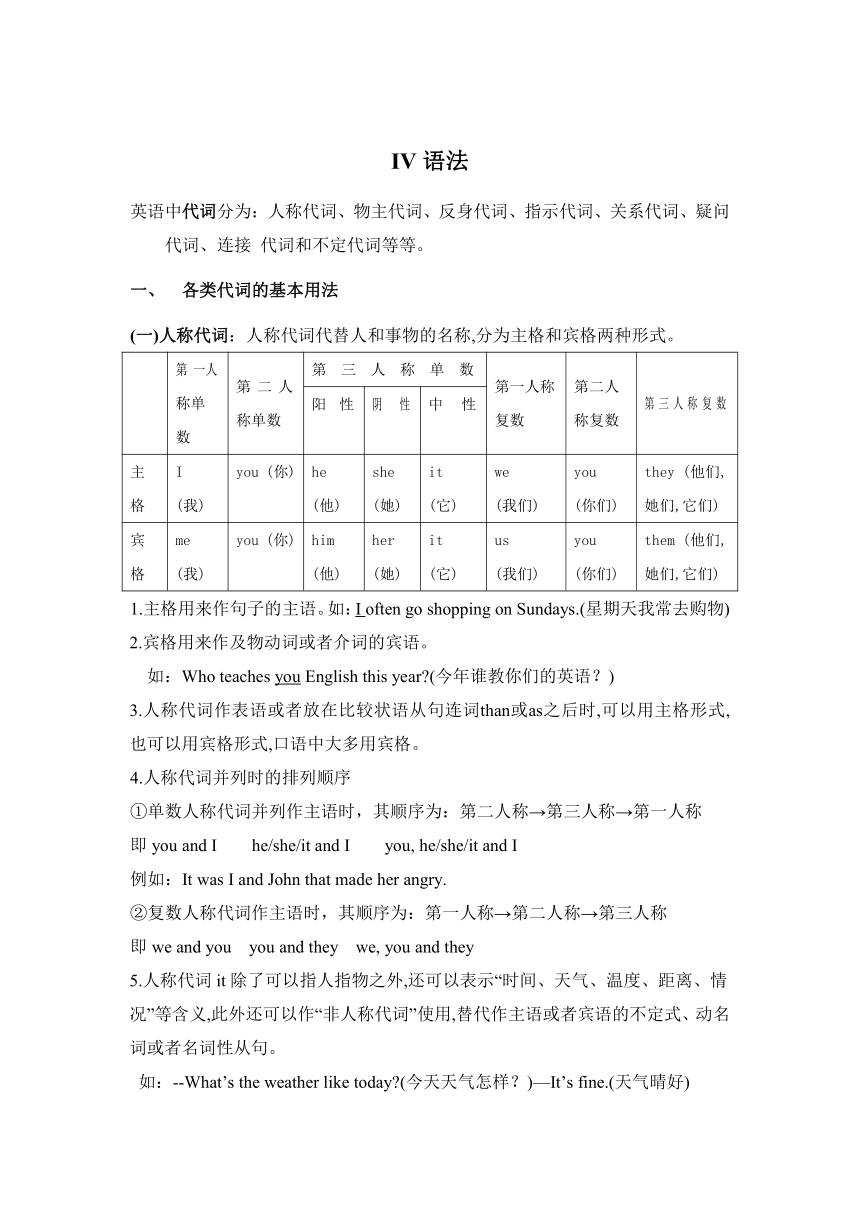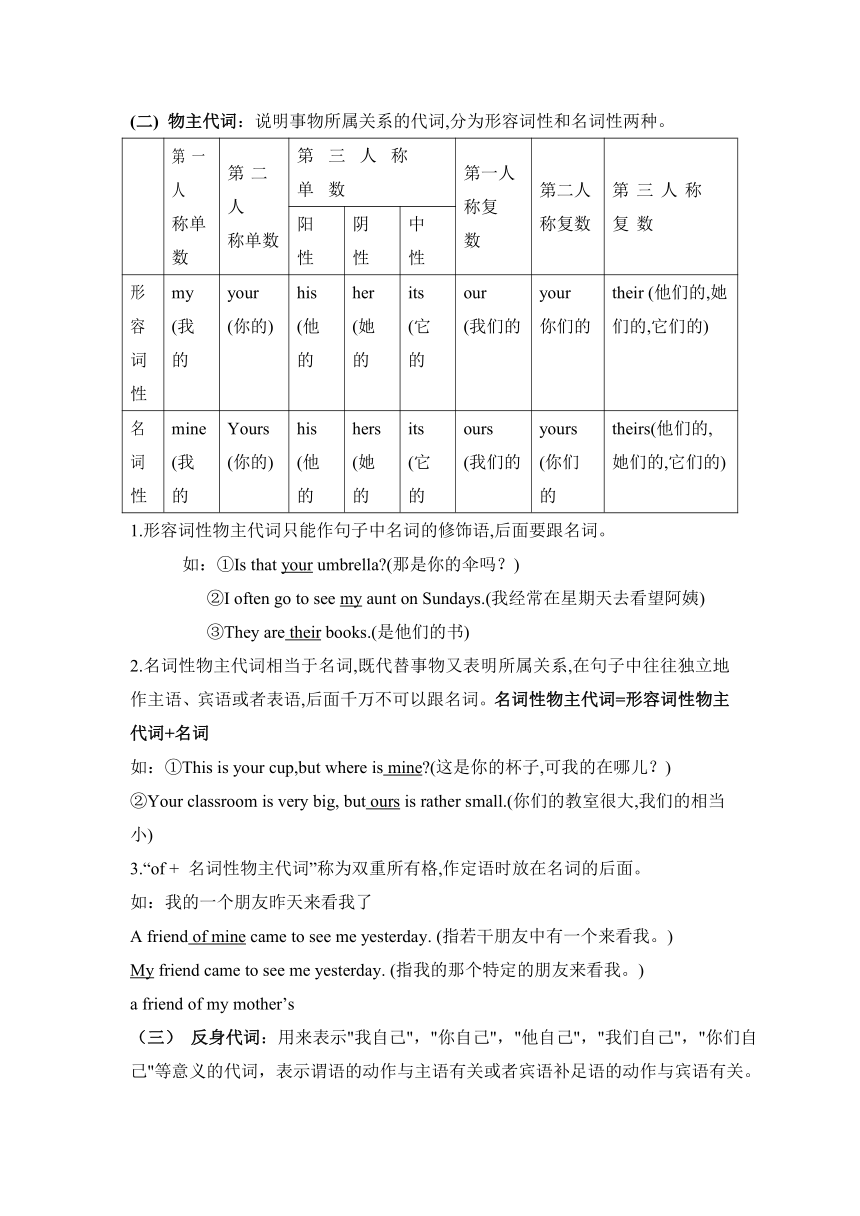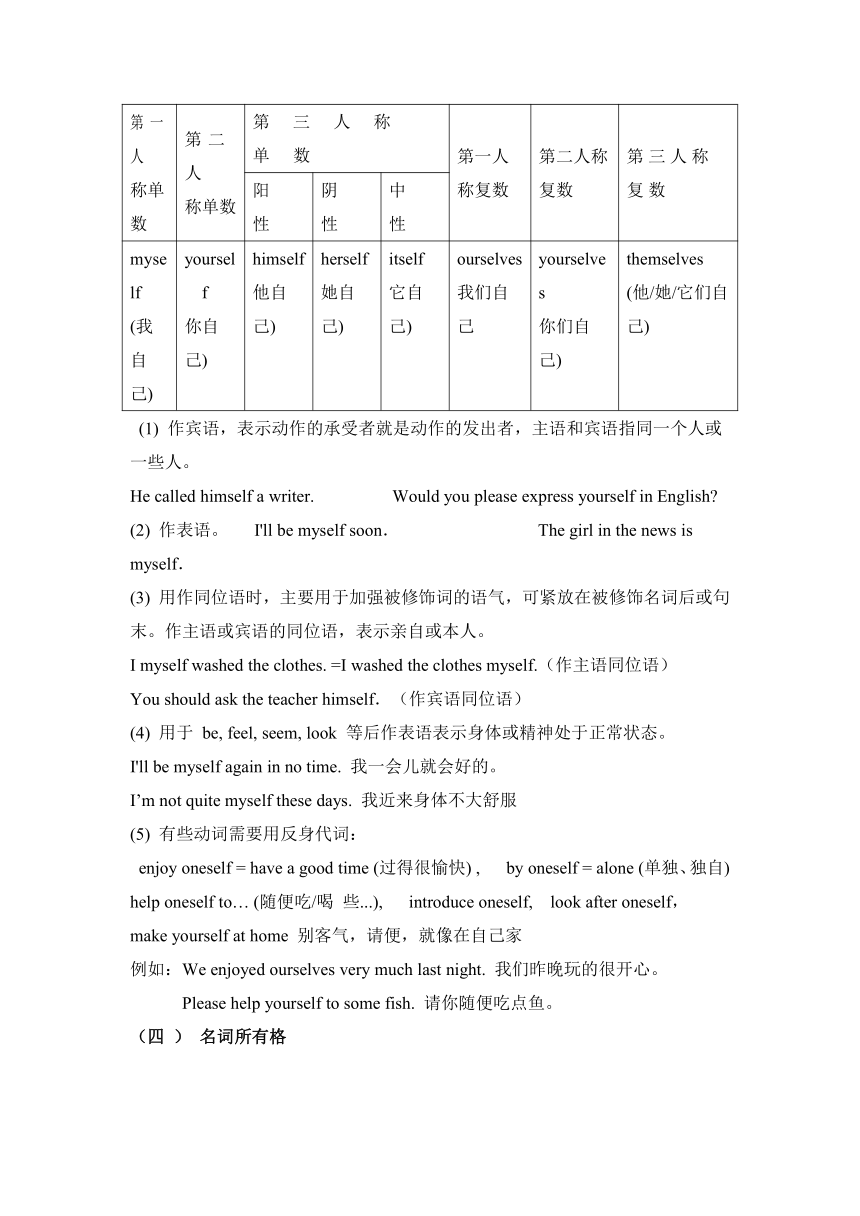牛津深圳版七上:Unit8 知识点总结 导学案(无答案)
文档属性
| 名称 | 牛津深圳版七上:Unit8 知识点总结 导学案(无答案) |  | |
| 格式 | docx | ||
| 文件大小 | 30.9KB | ||
| 资源类型 | 教案 | ||
| 版本资源 | 牛津深圳版 | ||
| 科目 | 英语 | ||
| 更新时间 | 2021-04-19 15:21:46 | ||
图片预览





文档简介
1016000011747500牛津版七年级英语上册
Unit8 Collecting things
Ⅰ重点单词
unusual adj.与众不同的 反义词:usual 普遍的
collect v.收集,搜集
interview n采访
model n.模型,模特
stamp n. 邮票
front adj.前面的
silver adj.银白色的
doorbell n.门铃
soon不久
pull 按,拉 反义词 push 推
grandson n.孙子,外孙
granddaughter n.外孙女
everywhere处处,到处
inside 里面 反义词:outside 外面
ago以前
follow跟随
hardly几乎不
space 空间
free 自由的
should 应该
sentence句子
magazine n.杂志
newspaper n.报纸
really确实,的确
famous adj.著名的
UK 英国 ( Britain /England)
over多余=more than
something 某事,某物(用于肯定句)
anything任何事/物(否定句和疑问句)
Ⅱ重点短语\句型
living room 起居室,客厅 works of art(绘画,雕塑)艺术作品
(be) bad for对··有害 be good for对···有好处
(be)interested in对···干兴趣 a waste of time 浪费时间
belong to 属于 thank you for=thanks for(for+n./v-ing/代词)
1.sb. spend (s) ... doing sth.
2.What do you think of ... ? 你认为···怎么样呢?
如:What do you think of the book?
III详细讲解
1.There are eight doorbells on their front door!在他们的前门上有八个门铃。(page101)
①front形容词,意为“前面的”。 This is our front garden.这是我们的前花园。
②
in front of指在某一范围以外的前面,反义词是behind
in the front of指在某一范围内部的前面,反义短语是at the back of
Tom is just sitting in the front of the car, and her friend Mary is standing in front of the car.汤姆正坐在汽车的前座,而她的朋友玛丽站在汽车的前面。
③front door意为“前门”,behind door是“后门”的意思。
2.···so you shouldn’t spend too much time collecting things.(page101)
too much
“太多”,修饰不可数名词;
用作副词词组时,可修饰动词;
用作名词词组时,可作表语、宾语等。
I drank too much beer last night. You have given me too much.
much too
“太,非常”,用作副词词组,
修饰形容词或副词,但不可修饰动词。
I’m afraid this car is much too expensive.
My wife is much too busy to see visitors.
too many
“太多”后接可数名词复数形式。
He has too many pens.
3.They(The games ) will take place in the playground. 它们(比赛)将在操场上举行。 (page105)
take place在此句中含义为“举行”,还有“发生,产生”等意思。
如:When will the basketball game take place.
take place:发生,常指经过安排的。 When will the wedding take place?
happen: 偶然发生,碰巧. What happened to you last night?
IV语法
英语中代词分为:人称代词、物主代词、反身代词、指示代词、关系代词、疑问代词、连接 代词和不定代词等等。
一、 各类代词的基本用法
(一)人称代词:人称代词代替人和事物的名称,分为主格和宾格两种形式。
第一人
称单数
第二人
称单数
第三人称单数
第一人称复数
第二人称复数
第三人称复数
阳性
阴性
中性
主
格
I
(我)
you (你)
he
(他)
she
(她)
it
(它)
we
(我们)
you
(你们)
they (他们,她们,它们)
宾
格
me
(我)
you (你)
him
(他)
her
(她)
it
(它)
us
(我们)
you
(你们)
them (他们,她们,它们)
1.主格用来作句子的主语。如:I often go shopping on Sundays.(星期天我常去购物)
2.宾格用来作及物动词或者介词的宾语。
如:Who teaches you English this year?(今年谁教你们的英语?)
3.人称代词作表语或者放在比较状语从句连词than或as之后时,可以用主格形式,也可以用宾格形式,口语中大多用宾格。
4.人称代词并列时的排列顺序
①单数人称代词并列作主语时,其顺序为:第二人称→第三人称→第一人称
即you and I he/she/it and I you, he/she/it and I
例如:It was I and John that made her angry.
②复数人称代词作主语时,其顺序为:第一人称→第二人称→第三人称
即we and you you and they we, you and they
5.人称代词it除了可以指人指物之外,还可以表示“时间、天气、温度、距离、情况”等含义,此外还可以作“非人称代词”使用,替代作主语或者宾语的不定式、动名词或者名词性从句。
如:--What’s the weather like today?(今天天气怎样?)—It’s fine.(天气晴好)
(二) 物主代词:说明事物所属关系的代词,分为形容词性和名词性两种。
第一人
称单数
第二人
称单数
第三人称单数
第一人称复 数
第二人称复数
第三人称复数
阳性
阴性
中性
形容
词性
my
(我的
your
(你的)
his
(他的
her
(她的
its
(它的
our
(我们的
your
你们的
their (他们的,她们的,它们的)
名词
性
mine
(我的
Yours
(你的)
his
(他的
hers
(她的
its
(它的
ours
(我们的
yours
(你们的
theirs(他们的,她们的,它们的)
1.形容词性物主代词只能作句子中名词的修饰语,后面要跟名词。
如:①Is that your umbrella?(那是你的伞吗?)
②I often go to see my aunt on Sundays.(我经常在星期天去看望阿姨)
③They are their books.(是他们的书)
2.名词性物主代词相当于名词,既代替事物又表明所属关系,在句子中往往独立地作主语、宾语或者表语,后面千万不可以跟名词。名词性物主代词=形容词性物主代词+名词
如:①This is your cup,but where is mine?(这是你的杯子,可我的在哪儿?)
②Your classroom is very big, but ours is rather small.(你们的教室很大,我们的相当小)
3.“of + 名词性物主代词”称为双重所有格,作定语时放在名词的后面。
如:我的一个朋友昨天来看我了
A friend of mine came to see me yesterday. (指若干朋友中有一个来看我。)
My friend came to see me yesterday. (指我的那个特定的朋友来看我。)
a friend of my mother’s
(三) 反身代词:用来表示"我自己","你自己","他自己","我们自己","你们自己"等意义的代词,表示谓语的动作与主语有关或者宾语补足语的动作与宾语有关。
第一人
称单数
第二人
称单数
第三人称单数
第一人称复数
第二人称复数
第三人称复数
阳性
阴性
中性
myself
(我自己)
yourself
你自己)
himself
他自己)
herself
她自己)
itself
它自己)
ourselves
我们自己
yourselves
你们自己)
themselves (他/她/它们自己)
(1) 作宾语,表示动作的承受者就是动作的发出者,主语和宾语指同一个人或一些人。
He called himself a writer. Would you please express yourself in English?
(2) 作表语。 I'll be myself soon. The girl in the news is myself.
(3) 用作同位语时,主要用于加强被修饰词的语气,可紧放在被修饰名词后或句末。作主语或宾语的同位语,表示亲自或本人。
I myself washed the clothes. =I washed the clothes myself.(作主语同位语)
You should ask the teacher himself.(作宾语同位语)
(4) 用于 be, feel, seem, look 等后作表语表示身体或精神处于正常状态。
I'll be myself again in no time. 我一会儿就会好的。
I’m not quite myself these days. 我近来身体不大舒服
有些动词需要用反身代词:
enjoy oneself = have a good time (过得很愉快) , by oneself = alone (单独、独自)
help oneself to… (随便吃/喝 些...), introduce oneself, look after oneself, make yourself at home 别客气,请便,就像在自己家
例如:We enjoyed ourselves very much last night. 我们昨晚玩的很开心。
Please help yourself to some fish. 请你随便吃点鱼。
(四 ) 名词所有格
1.名词所有格:表示有生命的东西的名词以及某些表示时间、距离、星球、世界、国家等无生命的东西的名词后加’s表示所有关系,叫做名词所有格。
例如:men’s room 男厕所 Chairman Mao’s works 毛主席著作
a stone’s throw 一步之遥 the moon’s light 月光
2.名词是以-s或-es结尾的则只在该名词后加’,来构成所有格。
例如:3 hours’ walk 三小时的路程 five minutes’ walk 五小时路程
tow miles’ distance 两英里的距离
3.用名词所有格表示处所
例如:a butcher’s 肉铺 a tailor’s 裁缝铺 a barber’s 理发店
a doctor’s 诊所 my sister’s 我姐姐家 stationer’s 文具店
区分:A’s and B’s mothers 意为“A的妈妈和B的妈妈”(两位妈妈)
A and B’s mother 意为“A和B共同的妈妈”(一位妈妈,A和B为兄弟姐妹)
课堂练习:
(一)语音
找出下列单词中划线部分的发音与其他不同的单词。
1. A. post B. hospital C. stop D. cross
2. A. show B. how C. own D. snow
3. A. my B. you C. your D. yard
4. A. house B. ground C. mouth D. trouble
5. A. put B. fun C. but D. Run
(二)单项选择
6. Our school is big, is small.
A. His B. Him C. It D. He
7.His pen is here, is at home.
A. I B. Me C.Mine D.My
8.Let help with her English.
A.me; she B.me;her C.I; him D.he;she
9. Your books are on the desk.What about ?
A. they B.theirs C.their D.them
10.Our city is more beautiful. We can see the trees on sides of the road.
A.every B. each C. all D. both
11.Don’t give children money. It si not good for them.
A. too many B.too much C.many too D.much too
12.Clean your room right now, please. There is rubbish .
A. anywhere B.somewhere C. no where D. everywhere
13.Ben works for his test to the USA,so he moves his body all day.
A. hard; hard B. hardly;hardly
C.hardly;hard D.hard;hardly
14.Will you this weekend? I want to invite you to my birthday party.
A. be free B. free C.freely D. be freely
15.I thank my mum very much. She makes me live every day.
A. happy B.happily C. more happy D.happier
(三)阅读理解
Do you like collecting stamps? I'll tell you about a set of wonderful stamps!
China has issued(发行) a set of four stamps to remember the great book Master Sun's Art of War. The first stamps were issued at Linyi in East China's Shangdong Province.
Master Sun was also called Sun Wu. He was a military strategist(军事家) during the Spring and Autumn period(770 BC- 476BC). He was a general(将军) in the army of the Wu Kingdom. During this period he wrote his great work Master Sun's Art of War.
Master Sun's Art of War is in 13 parts. It is one of the earliest and the most famous military books in the world. In the past 2500 years, the influence of this book has extended(扩大) from China to the whole world.
The stamps were drawn or designed by Chen Quansheng. He is a young artist. The prices of the four stamps are 20, 30,50 fen and one yuan. They are about Sun Wu and the stories about him.
In 1972, the important ancient copies of the Art of War were found in Linyi. This helps to understand Master Sun's military art greatly. The Linyi post office received about 10,000 letters asking for the first issues of the stamps.(221 words)
16.The meaning of the underlined word" period " is .
A. time B. war C. weather D. stamp
17. would like to study Master Sun's military art.
A. The Chinese people B. The people of the world
C. The foreigners D. The ancient people.
18.The stamps are about .
Master Sun B. the ancient war
C. military arts D. Sun Wu and the stories about him
19.Why are the first stamps issued in Linyi? Because .
A. Linyi is in Shangdong B.Linyi is Master Sun's hometown
C. Art of War was unearthed (出土)in Linyi D. the wars happened in Linyi
20.Which sentence of the four is NOT right?
A. Linyi post office can issue 10,000 of the first stamps at least.
B. Sun Wu was a general at Spring and Autumn period.
C. Chen Quansheng designed these stamps.
D. The picture of the stamps is two yuan.
(四)完成句子
21.你觉得他今天的演讲怎么样?
you his speech today?
22.我会向他学习的。
I him.
23.请把这个玻璃杯放到盒子里以保护它的安全。
Please this glass safe this box.
24.集邮是我的爱好。每获得一张邮票对我而言都是很开心的。
my hobby. It for me one every time.
补充:
[au]
发音要诀:将口张开略圆,逐渐合拢,双唇逐渐成圆形,不要一开始就把双唇收圆。开始部分和[ ai ]中的[ a ]音相同,由[ a ]平稳过渡到[ u ]音。滑动时双唇逐渐收成圆形,并把舌后部稍稍抬起。
[?u]
发音要诀:口半开半圆,舌后微微上升,过渡成双唇成圆形,发英语字母” O” 的长音。
?[i?] ? ? ?
发音要诀:双唇张开,牙床由窄至半开,舌抵下齿逐渐过渡上卷,从[ i ]音过渡到[ E ]音。发[ i ]时注意用扁平唇,嘴不要张得太大,以免发成[ ? ],[ e ?]。
[??]
发音要诀:双唇张开后略圆,牙床张开一定宽度,舌尖卷上慢慢卷后。
[u?]
发音要诀:双唇成圆形,牙床近于半合,舌尖不触下齿,由[ u ]音很快向[ E ]滑动。
注意[ u ] 不要发成[ u: ]音,或普通话的 “u”。
[ w ]
发音要诀:1、发音时舌后部向软腭抬起,但不要抵住
2、双唇收圆并向前突出
3、同时声带需震动
4、一经发出后舌头和双唇立刻向后面的元音滑动。
5、/w/是一个半元音和元音/u?/很相似,但元音可以单独成音可以延长,半元音不能单独成音,不可以延长,更不能在它后面附加元音
[ ?j ?]
发音要诀:1、舌前部向硬腭尽量抬起,不要抵住硬腭
2、双唇向两旁伸展成扁平形
3、同时声带需震动
4、一经发出后舌头和双唇立刻向后面的元音滑动。
5、/j/是个半元音,发音时口型和元音/i?/有点相似,但它仍是个辅音,元音可以单独成音可以延长,半元音不可以单独成音不可以延长。
Unit8 Collecting things
Ⅰ重点单词
unusual adj.与众不同的 反义词:usual 普遍的
collect v.收集,搜集
interview n采访
model n.模型,模特
stamp n. 邮票
front adj.前面的
silver adj.银白色的
doorbell n.门铃
soon不久
pull 按,拉 反义词 push 推
grandson n.孙子,外孙
granddaughter n.外孙女
everywhere处处,到处
inside 里面 反义词:outside 外面
ago以前
follow跟随
hardly几乎不
space 空间
free 自由的
should 应该
sentence句子
magazine n.杂志
newspaper n.报纸
really确实,的确
famous adj.著名的
UK 英国 ( Britain /England)
over多余=more than
something 某事,某物(用于肯定句)
anything任何事/物(否定句和疑问句)
Ⅱ重点短语\句型
living room 起居室,客厅 works of art(绘画,雕塑)艺术作品
(be) bad for对··有害 be good for对···有好处
(be)interested in对···干兴趣 a waste of time 浪费时间
belong to 属于 thank you for=thanks for(for+n./v-ing/代词)
1.sb. spend (s) ... doing sth.
2.What do you think of ... ? 你认为···怎么样呢?
如:What do you think of the book?
III详细讲解
1.There are eight doorbells on their front door!在他们的前门上有八个门铃。(page101)
①front形容词,意为“前面的”。 This is our front garden.这是我们的前花园。
②
in front of指在某一范围以外的前面,反义词是behind
in the front of指在某一范围内部的前面,反义短语是at the back of
Tom is just sitting in the front of the car, and her friend Mary is standing in front of the car.汤姆正坐在汽车的前座,而她的朋友玛丽站在汽车的前面。
③front door意为“前门”,behind door是“后门”的意思。
2.···so you shouldn’t spend too much time collecting things.(page101)
too much
“太多”,修饰不可数名词;
用作副词词组时,可修饰动词;
用作名词词组时,可作表语、宾语等。
I drank too much beer last night. You have given me too much.
much too
“太,非常”,用作副词词组,
修饰形容词或副词,但不可修饰动词。
I’m afraid this car is much too expensive.
My wife is much too busy to see visitors.
too many
“太多”后接可数名词复数形式。
He has too many pens.
3.They(The games ) will take place in the playground. 它们(比赛)将在操场上举行。 (page105)
take place在此句中含义为“举行”,还有“发生,产生”等意思。
如:When will the basketball game take place.
take place:发生,常指经过安排的。 When will the wedding take place?
happen: 偶然发生,碰巧. What happened to you last night?
IV语法
英语中代词分为:人称代词、物主代词、反身代词、指示代词、关系代词、疑问代词、连接 代词和不定代词等等。
一、 各类代词的基本用法
(一)人称代词:人称代词代替人和事物的名称,分为主格和宾格两种形式。
第一人
称单数
第二人
称单数
第三人称单数
第一人称复数
第二人称复数
第三人称复数
阳性
阴性
中性
主
格
I
(我)
you (你)
he
(他)
she
(她)
it
(它)
we
(我们)
you
(你们)
they (他们,她们,它们)
宾
格
me
(我)
you (你)
him
(他)
her
(她)
it
(它)
us
(我们)
you
(你们)
them (他们,她们,它们)
1.主格用来作句子的主语。如:I often go shopping on Sundays.(星期天我常去购物)
2.宾格用来作及物动词或者介词的宾语。
如:Who teaches you English this year?(今年谁教你们的英语?)
3.人称代词作表语或者放在比较状语从句连词than或as之后时,可以用主格形式,也可以用宾格形式,口语中大多用宾格。
4.人称代词并列时的排列顺序
①单数人称代词并列作主语时,其顺序为:第二人称→第三人称→第一人称
即you and I he/she/it and I you, he/she/it and I
例如:It was I and John that made her angry.
②复数人称代词作主语时,其顺序为:第一人称→第二人称→第三人称
即we and you you and they we, you and they
5.人称代词it除了可以指人指物之外,还可以表示“时间、天气、温度、距离、情况”等含义,此外还可以作“非人称代词”使用,替代作主语或者宾语的不定式、动名词或者名词性从句。
如:--What’s the weather like today?(今天天气怎样?)—It’s fine.(天气晴好)
(二) 物主代词:说明事物所属关系的代词,分为形容词性和名词性两种。
第一人
称单数
第二人
称单数
第三人称单数
第一人称复 数
第二人称复数
第三人称复数
阳性
阴性
中性
形容
词性
my
(我的
your
(你的)
his
(他的
her
(她的
its
(它的
our
(我们的
your
你们的
their (他们的,她们的,它们的)
名词
性
mine
(我的
Yours
(你的)
his
(他的
hers
(她的
its
(它的
ours
(我们的
yours
(你们的
theirs(他们的,她们的,它们的)
1.形容词性物主代词只能作句子中名词的修饰语,后面要跟名词。
如:①Is that your umbrella?(那是你的伞吗?)
②I often go to see my aunt on Sundays.(我经常在星期天去看望阿姨)
③They are their books.(是他们的书)
2.名词性物主代词相当于名词,既代替事物又表明所属关系,在句子中往往独立地作主语、宾语或者表语,后面千万不可以跟名词。名词性物主代词=形容词性物主代词+名词
如:①This is your cup,but where is mine?(这是你的杯子,可我的在哪儿?)
②Your classroom is very big, but ours is rather small.(你们的教室很大,我们的相当小)
3.“of + 名词性物主代词”称为双重所有格,作定语时放在名词的后面。
如:我的一个朋友昨天来看我了
A friend of mine came to see me yesterday. (指若干朋友中有一个来看我。)
My friend came to see me yesterday. (指我的那个特定的朋友来看我。)
a friend of my mother’s
(三) 反身代词:用来表示"我自己","你自己","他自己","我们自己","你们自己"等意义的代词,表示谓语的动作与主语有关或者宾语补足语的动作与宾语有关。
第一人
称单数
第二人
称单数
第三人称单数
第一人称复数
第二人称复数
第三人称复数
阳性
阴性
中性
myself
(我自己)
yourself
你自己)
himself
他自己)
herself
她自己)
itself
它自己)
ourselves
我们自己
yourselves
你们自己)
themselves (他/她/它们自己)
(1) 作宾语,表示动作的承受者就是动作的发出者,主语和宾语指同一个人或一些人。
He called himself a writer. Would you please express yourself in English?
(2) 作表语。 I'll be myself soon. The girl in the news is myself.
(3) 用作同位语时,主要用于加强被修饰词的语气,可紧放在被修饰名词后或句末。作主语或宾语的同位语,表示亲自或本人。
I myself washed the clothes. =I washed the clothes myself.(作主语同位语)
You should ask the teacher himself.(作宾语同位语)
(4) 用于 be, feel, seem, look 等后作表语表示身体或精神处于正常状态。
I'll be myself again in no time. 我一会儿就会好的。
I’m not quite myself these days. 我近来身体不大舒服
有些动词需要用反身代词:
enjoy oneself = have a good time (过得很愉快) , by oneself = alone (单独、独自)
help oneself to… (随便吃/喝 些...), introduce oneself, look after oneself, make yourself at home 别客气,请便,就像在自己家
例如:We enjoyed ourselves very much last night. 我们昨晚玩的很开心。
Please help yourself to some fish. 请你随便吃点鱼。
(四 ) 名词所有格
1.名词所有格:表示有生命的东西的名词以及某些表示时间、距离、星球、世界、国家等无生命的东西的名词后加’s表示所有关系,叫做名词所有格。
例如:men’s room 男厕所 Chairman Mao’s works 毛主席著作
a stone’s throw 一步之遥 the moon’s light 月光
2.名词是以-s或-es结尾的则只在该名词后加’,来构成所有格。
例如:3 hours’ walk 三小时的路程 five minutes’ walk 五小时路程
tow miles’ distance 两英里的距离
3.用名词所有格表示处所
例如:a butcher’s 肉铺 a tailor’s 裁缝铺 a barber’s 理发店
a doctor’s 诊所 my sister’s 我姐姐家 stationer’s 文具店
区分:A’s and B’s mothers 意为“A的妈妈和B的妈妈”(两位妈妈)
A and B’s mother 意为“A和B共同的妈妈”(一位妈妈,A和B为兄弟姐妹)
课堂练习:
(一)语音
找出下列单词中划线部分的发音与其他不同的单词。
1. A. post B. hospital C. stop D. cross
2. A. show B. how C. own D. snow
3. A. my B. you C. your D. yard
4. A. house B. ground C. mouth D. trouble
5. A. put B. fun C. but D. Run
(二)单项选择
6. Our school is big, is small.
A. His B. Him C. It D. He
7.His pen is here, is at home.
A. I B. Me C.Mine D.My
8.Let help with her English.
A.me; she B.me;her C.I; him D.he;she
9. Your books are on the desk.What about ?
A. they B.theirs C.their D.them
10.Our city is more beautiful. We can see the trees on sides of the road.
A.every B. each C. all D. both
11.Don’t give children money. It si not good for them.
A. too many B.too much C.many too D.much too
12.Clean your room right now, please. There is rubbish .
A. anywhere B.somewhere C. no where D. everywhere
13.Ben works for his test to the USA,so he moves his body all day.
A. hard; hard B. hardly;hardly
C.hardly;hard D.hard;hardly
14.Will you this weekend? I want to invite you to my birthday party.
A. be free B. free C.freely D. be freely
15.I thank my mum very much. She makes me live every day.
A. happy B.happily C. more happy D.happier
(三)阅读理解
Do you like collecting stamps? I'll tell you about a set of wonderful stamps!
China has issued(发行) a set of four stamps to remember the great book Master Sun's Art of War. The first stamps were issued at Linyi in East China's Shangdong Province.
Master Sun was also called Sun Wu. He was a military strategist(军事家) during the Spring and Autumn period(770 BC- 476BC). He was a general(将军) in the army of the Wu Kingdom. During this period he wrote his great work Master Sun's Art of War.
Master Sun's Art of War is in 13 parts. It is one of the earliest and the most famous military books in the world. In the past 2500 years, the influence of this book has extended(扩大) from China to the whole world.
The stamps were drawn or designed by Chen Quansheng. He is a young artist. The prices of the four stamps are 20, 30,50 fen and one yuan. They are about Sun Wu and the stories about him.
In 1972, the important ancient copies of the Art of War were found in Linyi. This helps to understand Master Sun's military art greatly. The Linyi post office received about 10,000 letters asking for the first issues of the stamps.(221 words)
16.The meaning of the underlined word" period " is .
A. time B. war C. weather D. stamp
17. would like to study Master Sun's military art.
A. The Chinese people B. The people of the world
C. The foreigners D. The ancient people.
18.The stamps are about .
Master Sun B. the ancient war
C. military arts D. Sun Wu and the stories about him
19.Why are the first stamps issued in Linyi? Because .
A. Linyi is in Shangdong B.Linyi is Master Sun's hometown
C. Art of War was unearthed (出土)in Linyi D. the wars happened in Linyi
20.Which sentence of the four is NOT right?
A. Linyi post office can issue 10,000 of the first stamps at least.
B. Sun Wu was a general at Spring and Autumn period.
C. Chen Quansheng designed these stamps.
D. The picture of the stamps is two yuan.
(四)完成句子
21.你觉得他今天的演讲怎么样?
you his speech today?
22.我会向他学习的。
I him.
23.请把这个玻璃杯放到盒子里以保护它的安全。
Please this glass safe this box.
24.集邮是我的爱好。每获得一张邮票对我而言都是很开心的。
my hobby. It for me one every time.
补充:
[au]
发音要诀:将口张开略圆,逐渐合拢,双唇逐渐成圆形,不要一开始就把双唇收圆。开始部分和[ ai ]中的[ a ]音相同,由[ a ]平稳过渡到[ u ]音。滑动时双唇逐渐收成圆形,并把舌后部稍稍抬起。
[?u]
发音要诀:口半开半圆,舌后微微上升,过渡成双唇成圆形,发英语字母” O” 的长音。
?[i?] ? ? ?
发音要诀:双唇张开,牙床由窄至半开,舌抵下齿逐渐过渡上卷,从[ i ]音过渡到[ E ]音。发[ i ]时注意用扁平唇,嘴不要张得太大,以免发成[ ? ],[ e ?]。
[??]
发音要诀:双唇张开后略圆,牙床张开一定宽度,舌尖卷上慢慢卷后。
[u?]
发音要诀:双唇成圆形,牙床近于半合,舌尖不触下齿,由[ u ]音很快向[ E ]滑动。
注意[ u ] 不要发成[ u: ]音,或普通话的 “u”。
[ w ]
发音要诀:1、发音时舌后部向软腭抬起,但不要抵住
2、双唇收圆并向前突出
3、同时声带需震动
4、一经发出后舌头和双唇立刻向后面的元音滑动。
5、/w/是一个半元音和元音/u?/很相似,但元音可以单独成音可以延长,半元音不能单独成音,不可以延长,更不能在它后面附加元音
[ ?j ?]
发音要诀:1、舌前部向硬腭尽量抬起,不要抵住硬腭
2、双唇向两旁伸展成扁平形
3、同时声带需震动
4、一经发出后舌头和双唇立刻向后面的元音滑动。
5、/j/是个半元音,发音时口型和元音/i?/有点相似,但它仍是个辅音,元音可以单独成音可以延长,半元音不可以单独成音不可以延长。
